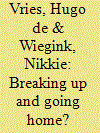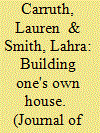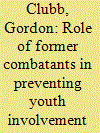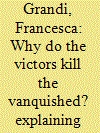|
|
|
Sort Order |
|
|
|
Items / Page
|
|
|
|
|
|
|
| Srl | Item |
| 1 |
ID:
101813


|
|
|
|
|
| Publication |
2011.
|
| Summary/Abstract |
This article argues that the common assumptions that lie behind efforts to break the command and control structures of armed groups, and working on 'community reintegration', are not necessary prerequisites for a successful disarmament, demobilization and reintegration (DDR) process. Former fighters may encounter troubles going home, as their communities of origin may not be as open to them as is often assumed. They may also have no other choice than to keep their military structures intact. However, this may not necessarily impede their social integration. In fact, the structures emerging from war may be relatively constructive for the socio-economic rehabilitation of former fighters.
|
|
|
|
|
|
|
|
|
|
|
|
|
|
|
|
| 2 |
ID:
183922


|
|
|
|
|
| Summary/Abstract |
This study uses ethnography along Ethiopian women's irregular migration routes through Djibouti to analyse the complex reasons women leave home to seek labour opportunities in the Gulf States. Theories and policies that either narrowly depict women's motivations as economic in nature or focus only on women's needs for security and protection, fail to account both for the politics of seeking employment abroad, and the ways migration provides women a potential refuge from various forms of violence at home. Using a feminist analysis, we argue that women do not migrate only for financial opportunities, but also to escape combinations of domestic, political and structural violence. As such, irregular migration both evinces a failure of asylum systems and humanitarian organisations to protect Ethiopians, and a failure of the state to provide Ethiopian women meaningful citizenship. Lacking both protection and meaningful citizenship, international migration represents women's journeys for opportunity and emancipation.
|
|
|
|
|
|
|
|
|
|
|
|
|
|
|
|
| 3 |
ID:
145823


|
|
|
|
|
| Summary/Abstract |
The article engages with emerging debates on the potential role returning Islamic State fighters may have in preventing violence and whether nonviolent radical ideology acts as a conveyor-belt or firewall to violence. Rather than focusing on former combatant ideologies, it demonstrates how framing processes—not ideology per se—are more salient indicators of whether former combatants will act as conveyor-belts or firewalls to violence. The analytical framework developed for analyzing framing processes is then applied to the case of Northern Ireland. It argues that ideology shapes and constrains the type of antiviolence framing that may emerge, which provides a middle ground between the two perspectives in the literature. Furthermore, the article highlights the importance of network structures, incentives, and opportunities insofar as these can shape antiviolence framing and improve resonance among audiences. While recognizing the differences between cases, the framework is then used to argue that former Islamic State combatants can play a preventative role depending on whether their antiviolence framing is based on durable structural conditions, de-glamorizes violence, and is supported by networks that incentivize its diffusion—not on whether they have denounced their ideology.
|
|
|
|
|
|
|
|
|
|
|
|
|
|
|
|
| 4 |
ID:
124108


|
|
|
|
|
| Publication |
2013.
|
| Summary/Abstract |
When World War II ended in Italy, the violence did not. During the following year, about 10,000 individuals were summarily executed. Why does armed violence continue after a war's end? Why do the victors kill the vanquished enemies? Why do they do so in certain places but not in others? We do not have sufficiently satisfying answers to these questions. The literature makes sense of violence if it happens during or preceding an armed conflict, but overlooks it when it occurs after the war is over. We need to fill this gap. Not only does post-conflict violence merit consideration as a phenomenon in itself but also it is crucial to understand postwar politics. The structured comparison of two provinces in Italy at the end of WWII shows that existing explanations cannot fully account for the spatial variation of the killings there. I offer an alternative argument: post-conflict violence aims to influence a country's political future. In post-WWII Italy, the strategic calculations and the political preferences of former resistance combatants, combined with the legacy of the past war, determined the variation in the killings. Historical cases are a major untapped source of theory-building in conflict and peace studies. The micro-level dynamics generating violence at the local level often follow similar patterns across space and time. Thus, understanding extrajudicial executions in post-WWII Italy can illuminate today's international intervention strategies addressing similar patterns of violence in different post-conflict settings.
|
|
|
|
|
|
|
|
|
|
|
|
|
|
|
|
|
|
|
|
|